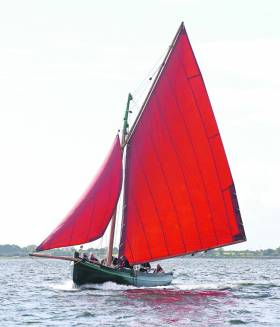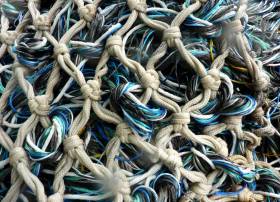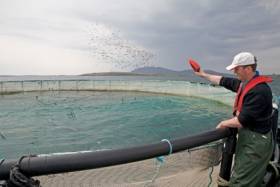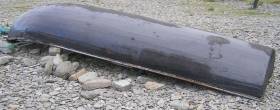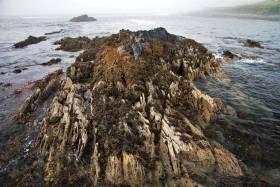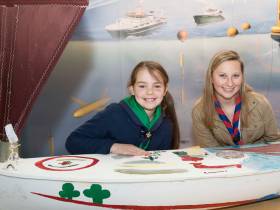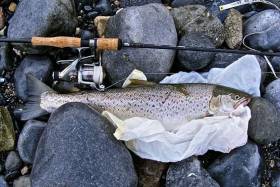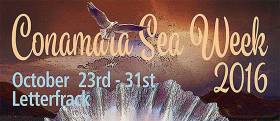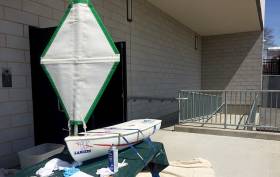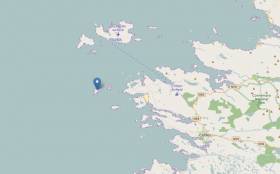Displaying items by tag: Connemara
This weekend’s annual Cruinnui na mBad festival (the Gathering of the Boats) in Kinvara in the southeast corner of Galway Bay celebrates a tradition going back far into the mists of time writes W M Nixon. In the old days, it was a matter of necessity that the fleet of working Galway hookers in Connemara should sail up and across the bay, bringing the winter’s consignment of turf to a region where it’s a relatively scarce commodity.
The healthy mixture of commerce and effectively racing under sail, with festivities at the conclusion of a job well done, inevitably developed into a regatta atmosphere, West of Ireland style. So much so, in fact, that these days, the annual Cruinnui na mBad is a major event, which can attract a fleet of up to a hundred boats.
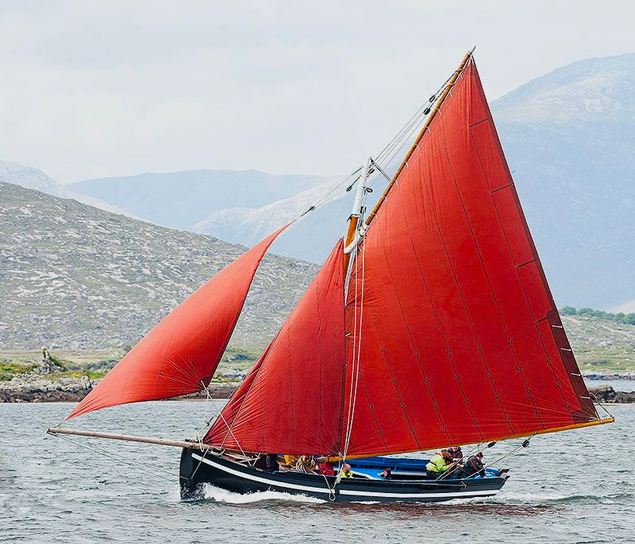 The spirit of Connemara. The Baily family’s classic An Capall making knots under a rugged western coastline
The spirit of Connemara. The Baily family’s classic An Capall making knots under a rugged western coastline
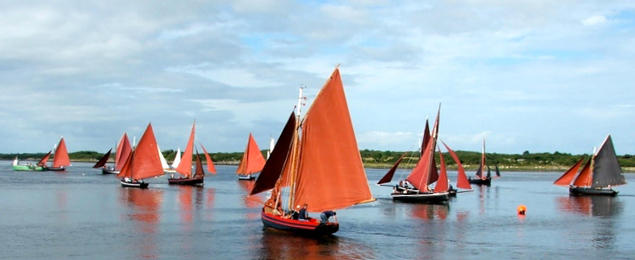 The Gathering of the Boats – some of the traditional fleet at Kinvara
The Gathering of the Boats – some of the traditional fleet at Kinvara
There’s now something extra to celebrate, as new boats to the traditional designs are being built at a steady rate by Colie Hernon and Peter Connolly and their team in Badoiri na Gaillimh in the Claddagh in Galway, and one of their creations is the central feature in the maritime display in the nearby City of Galway museum.
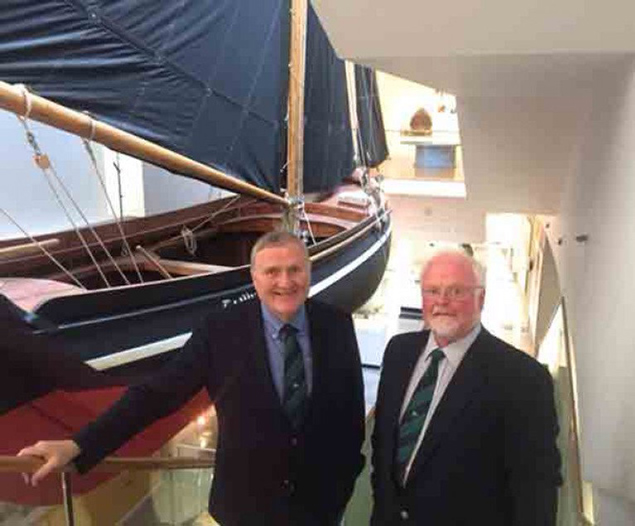 Jack Roy, President Irish Sailing (left) with Pierce Purcell of Galway and the traditional gleitog which is the centrepiece of the Maritime Section of Galway Museum.
Jack Roy, President Irish Sailing (left) with Pierce Purcell of Galway and the traditional gleitog which is the centrepiece of the Maritime Section of Galway Museum.
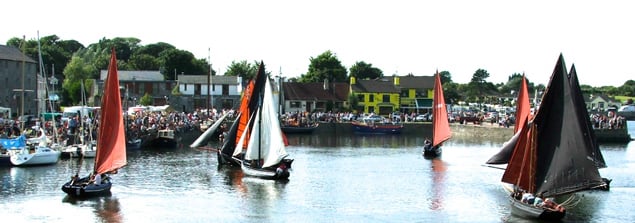 The fleet gathering at hospitable quayside in the heart of Kinvara
The fleet gathering at hospitable quayside in the heart of Kinvara
They are currently working on their seventh boat, a gleitog to be known as the Markeeen Joe. And a fine bit of work she is too, with completion anticipated for the Autumn. But they’ll be well represented by other craft they’ve built in Kinvara on Saturday and Sunday, when good weather is hoped to prevail until at least the middle of Sunday, and there’ll be no lack of proper sailing breezes.
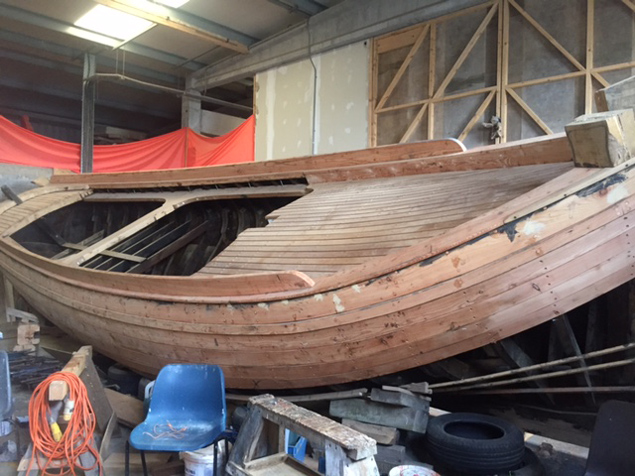 The new Markeen Joe under construction (above and below) in Galway city. Photo: Pierce Purcell
The new Markeen Joe under construction (above and below) in Galway city. Photo: Pierce Purcell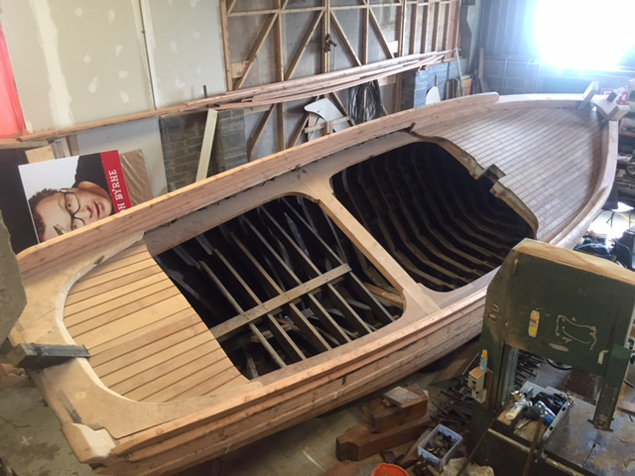
Deployment Of Sampling Nets At Bertraghboy Bay In Connemara
#MarineScience - The Marine Institute has begun deployment of bag nets for a scientific sampling of Bertraghboy Bay and surrounding waters in Connemara.
The nets — checked daily, weather permitting — will extend outward from the coast for some 30 metres, perpendicular to the shoreline. They will be clearly marked with brightly coloured buoys (mainly orange) and labeled with Marine Institute identification.
Deployment was set to begin at and around co-ordinates 53°25’19”N, 9°52’52”W this past Monday 26 June and will continue till Monday 21 August, weather dependent. They are being deployed using a small open boat powered by an outboard engine.
The Marine Institute contact for this survey is Dave Jackson at 091 387 200 or 087 699 3259.
#MarineScience - A new marine research cluster is planned for Connemara incorporating the Údaras na Gaeltachta facility at Pairc na Mara currently under development in Cill Chiaráin, NUI Galway’s Carna Campus Laboratories, and an aquaculture site in Beirtreach Buí near Carna.
The Connemara cluster will form part of a national aquaculture research cluster which includes the Marine Institute facilities at Newport, Co Mayo, with the Beirtreach Buí site touted as “an important part of the State’s marine research infrastructure”.
In 2016, the Marine Institute secured EU Horizon 2020 and Science Foundation Ireland funding for a range of research projects that will be carried out in close collaboration with Marine Institute teams in Newport and Galway as well as researchers at the NUI Galway campus in Carna and the Udaras na Gaeltachta facility at Páirc na Mara.
These research projects will include studies on cleaner fish, which are used to control sea lice and other external parasites; animal welfare; and poly culture of shellfish, fin fish and seaweeds to enhance biodiversity and reduce environmental impacts.
The Marine Institute says it has committed funding to create three jobs to run and maintain the Beirtreach Buí aquaculture research site and provide support to marine research teams and projects.
The Beirtreach Buí site is expected to support a number of research projects in the coming years, including the development of integrated multi-trophic aquaculture, which provides the by-products, including waste, from one aquatic species as inputs (fertilizers, food) for another. This research will be in association with project partners in both Irish third-level institutions and partners from other EU states.
The site will also be used to support a major international project TAPAS, which has received €7 million from the EU under Horizon 2020.
The TAPAS project aims to develop cost-efficient management tools and practices for the European aquaculture sector to investigate the limits to fish farming activity in a location, social interactions, potential environmental impacts and any future risks.
The Marine Institute has applied to the Department of Agriculture, Food and the Marine to amend the licence for the aquaculture site at Beirtreach Buí from a commercial to a research license.
This application to amend the aquaculture licence at Beirtreach Buí will involve a reduction in the size of the site, a decrease in the number of licensed structures, from 48 structures to a maximum of 12 cages and 12 smaller structures made up of a combination of long lines and sentinel cages/passive sampling structures.
The amendment also includes a reduction in the level of fish stock at the site from the current level of 100 tonnes to a maximum of 50 tonnes. The amended license will allow for holding a range of fish, shellfish and seaweed species for research purposes. No commercial production will be licensed at the site.
The site was originally used for farming salmon in the 1980s and, in 2010, the aquaculture licence was amended in order to carry out culture trials on cod in collaboration with NUI Galway and Údaras na Gaeltachta.
In 2013 the site was taken over by the Marine Institute to focus on research work on cod and related studies, including research into natural alternatives for antifouling.
The new research licence application will go to public consultation this week.
#Currach - The first of four new community-built currachs launches from Inishbofin this afternoon (Sunday 30 April), as Galway Bay FM reports.
Young people from the Connemara island have been heavily involved in the traditional boat-building project, funded via the Coca-Cola Thank You Fund for voluntary groups.
And they will see the fruit of their hard work take to the water from the Old Pier at 1pm today, coinciding with the final day of this year’s Inishbofin Arts Festival.
Marine Institute Researcher Runner-Up In EU Photo Contest
#MarinePhoto - A marine researcher at the Marine Institute was recently runner-up in the EU-funded CommBeBiz photography competition with the theme of ‘New Perspectives on the Bio-Economy’.
Tomasz Szumski captured the prize-winning shot ‘Micro Island - Connemara’ when he provided technical and photographic support to Dr Jenny Ronan during sampling and subsampling of the seaweed for the AsMARA project along the Connemara coastline.
AsMARA (arsenic in marine macro algae) is a three-year project funded by the Department of Agriculture, Food and Marine’s Food Institutional Research Measure (FIRM), and is a marine science collaboration between the Marine Institute involving Dr Evin McGovern and NUI Galway’s Dr Dagmar Stengel to research seaweeds found in Ireland and assess their implications for commercial uses.
Over 100 scientists from across nine European countries entered the photo contest to highlight aspects of their research that supports the development of the European bio-economy to reduce the EU’s dependency on fossil resources, and contribute to producing environmentally friendly renewable products that meet our needs for food, materials and energy.
With the ocean representing over 70% of the earth’s surface, living marine resources such as seaweeds can provide a significant contribution to food, energy and bio-based products.
“In Ireland, there is a long tradition of using seaweeds and an increasing international interest in developing this resource into a range of products such as foods, fertilisers, animal feed and cosmetics,” said Szumski.
Through this research, the Marine Institute says it is evaluating the variability in the levels of organic and inorganic forms of arsenic in commercially harvested seaweed species to ensure their safety for such uses as food supplements and cosmetic components. The information generated supports innovation of blue biotechnologies, as well as assisting policy makers in risk management for consumer protection.
The winning photos in the 2017 CommBeBiz photo competition are being exhibited online on European project websites including CommBeBiz and the BioStep Project, as well as in Horizon Magazine, the European Commission’s research and innovation journal.
Entries for the 2018 edition will open on Monday 1 May.
Transatlantic Friendship Over Unmanned US Sailboat
#Lancer - An American high school student this week made the trip across the Atlantic to meet the Galway schoolgirl who found her marine science project mini-yacht last year.
Kaitlyn Dow from Waterford High School in Connecticut met eight-year-old Méabh Ní Ghionnáin for the first time at the Marine Institute in Galway for the official handover of the unmanned Lancer sailboat, which is set to be relaunched from the RV Celtic Explorer in the Atlantic later this year.
The 1.5m boat provided by Educational Passages was used as part of Kaitlyn's year-long research project studying wind and currents in the ocean.
Fitted with a GPS transmitter, the boat was released in May 2016 by NOAA ship Neil Armstrong off the coast of Cape Cod and successfully crossed the Atlantic.
In September, Kaitlyn made an appeal to Afloat.ie readers to keep a look-out for Lancer as it was tracked as far as Galway Bay.
And when it was eventually washed up in Connemara on 20 September, Méabh was the first to find it after following its GSP signal to a spot near her home in Lettermore.
Marine Institute chief executive Dr Peter Heffernan congratulated Méabh and Kaitlyn on their endeavours, adding: "We are thrilled to be involved with the continued voyage of the Lancer sailboat where it will be launched from the research vessel RV Celtic Explorer during its up and coming transatlantic expedition in April.
"This story is a wonderful example of both science literacy and citizen engagement with the oceans – themes which are a priority for the Atlantic Ocean Research Alliance between Canada, the EU and USA.
“Seeing new friendships formed across the Atlantic at an early age highlights the value of international partnerships that are essential for sharing marine science.”
Dr Heffernan added: “With the Atlantic being the second largest ocean in the world, it is important to increase our awareness of the value, opportunities and societal benefits the ocean provides us.”
Michael O'Connor, Kaitlyn's science teacher from Waterford High School, also made the trip to Ireland wit her and her family.
"I am thrilled to see this project to the next stage bringing Méabh and Kaitlyn together,” he said. “Although this started as a science project, the social connections and the sea that binds them are just as important as the data collected.
"Kaitlyn learned to design a study from the ground up, figure out how to fund it, make the social and professional connections to further the project and foster an international dialog about the ocean.
“She has a love for sailing and turned that love into a science project with great social impact and a great story. She will carry that combined social service and love of the sea to the Coast Guard Academy next year for college.”
Lancer was repaired by Ciaran Oliver and James Rattigan from Port of Galway Sea Scouts, as previously reported on Afloat.ie.
The Sea Scouts recently visited the RV Celtic Explorer with Méabh and will also be attending a seashore safari with Galway Atlantaquaria and the Explorers Education Programme team later this month.
Poaching Threat To Connemara Angling Tourism
#Angling - Poaching is a direct threat to efforts to revive salmon and trout angling and associated tourism in Connemara, a local business has warned.
Brian Curran of Lough Corrib-based Ireland West Angling told the Connacht Tribune that poachers are doing “untold damage to rehabilitation efforts” in Spiddal and environs, following a recent conviction of a local man for unlawful netting on the Boluisce River.
Such illegal practices disturb the painstaking work of Inland Fisheries Ireland staff and local registered fisheries to clear obstructions and place spawning gravel to aid fish in their migration.
The story comes weeks after Northern Irish anglers expressed their own concerns over poaching and pollution in the Carlingford and Lough Foyle areas, as previously reported on Afloat.ie.
Mini Regatta Kicks Off Conamara Sea Week
#ConamaraSeaWeek - The 32nd Conamara Sea Week got under way in Letterfrack yesterday (Sunday 23 October) with a full programme of entertaining and educational events, including a mini sailing regatta.
The Connacht Tribune has much more on the maritime festival line-up for the week ahead, centred this year around a schools programme bringing together marine ecologists and storytellers to involve children and young people in Connemara in all aspects of the sea.
Unmanned Mini Yacht Found In Connemara After Search Appeal
#Unmanned - Following our previous alert for an unmanned yacht off the Galway coast, the mini-yacht has been found after making landfall.
Kaitlyn Dow's self-built vessel Lancer was launched off the US coast four months ago as part of a high-school marine science project.
The now final-year student at Waterford High School in Connecticut tracked her sailboat by GPS across the Atlantic as it inched towards Galway Bay and Connemara.
It was finally recovered this past Saturday 17 September by eight-year-old Maedhbh Ní Ghionnáin on an island near her home in Lettermore, as The Day reports.
After her aunt received an email from Dow asking for any details of her boat's whereabouts, Maedhbh's family had been keeping a lookout before they found it on a beach virtually on their doorstep.
“In the middle of the day we went walking by the sea, and then we saw this white thing,” said Maedhbh, who also shared the story of her remarkable discovery with Raidió na Gaeltachta.
The news comes a month after another unmanned research sailboat was reported off the Kerry coast after nearly three years in the North Atlantic.
Clifden Man Treated For Hypothermia After Boat Sinks Off Connemara
#Rescue - Galway Bay FM reports that a man was recovering from hypothermia last night (Tuesday 13 September) after his boat sank off Connemara.
The man had set out from Clifden earlier in the day headed for Ardoileán, or High Island, off northwest Connemara, when the transom securing the engine to his vessel fell off.
Visitors walking near Cleggan heard his cries for help when he managed to swim the shore, and he was later transferred to hospital in Castlebar for treatment.



























